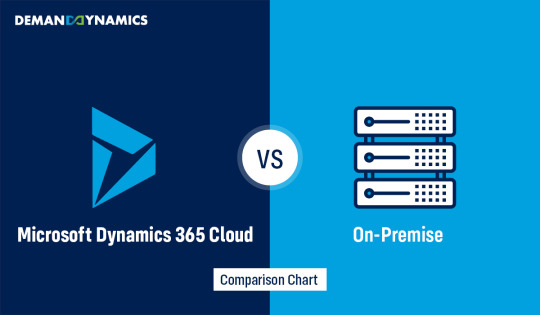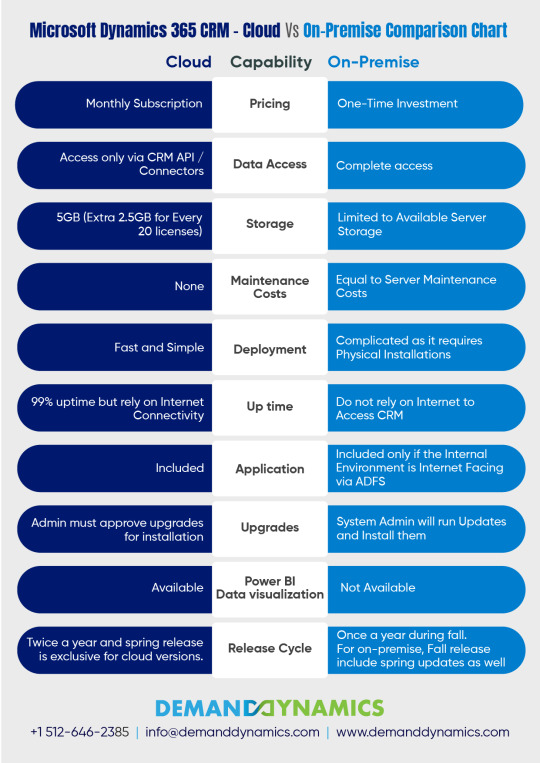#onpremisetocloud
Explore tagged Tumblr posts
Text
youtube
Tired of the challenges of managing both on-premise and cloud infrastructures? 🌐 Clonetab Software is here to simplify the integration, ensuring seamless connectivity, secure data synchronization, and enhanced cloud security! 🔑 ✅ Simplify hybrid IT environments ✅ Strengthen cloud security ✅ Streamline your business processes
Say goodbye to the complexity of managing multiple environments and hello to smooth, secure transitions! 🚀
#CloudSecurity#HybridCloud#ClonetabSoftware#ITInfrastructure#TechInnovation#CloudSolutions#OnPremiseToCloud#SecureTheCloud#CloudComputing#BusinessTech#Youtube
0 notes
Photo

One of the critical considerations while deciding between Cloud Vs. On-premise deployment is 𝗖𝗼𝘀𝘁 and 𝗠𝗮𝗶𝗻𝘁𝗲𝗻𝗮𝗻𝗰𝗲.𝗟𝗶𝗰𝗲𝗻𝘀𝗲 𝗙𝗲𝗲𝘀 - The cloud version of D365BC is licensed on a subscription model, monthly or annual basis. On the other hand, on-premise Business Central has a perpetual license.𝗛𝗮𝗿𝗱𝘄𝗮𝗿𝗲 - D365BC is hosted on Azure Cloud, no need for hardware or to install any software. On-premise as the name suggests requires investment in hardware and space.𝗠𝗮𝗶𝗻𝘁𝗲𝗻𝗮𝗻𝗰𝗲 - Maintenance expenses are lower for Cloud Solutions as updates are scheduled automatically and managed by Microsoft or its partners. In the case of On-premise there maybe an additional requirement for IT resource.Primarily 𝙈𝙞𝙘𝙧𝙤𝙨𝙤𝙛𝙩 𝘿𝙮𝙣𝙖𝙢𝙞𝙘𝙨 365 𝘽𝙪𝙨𝙞𝙣𝙚𝙨𝙨 𝘾𝙚𝙣𝙩𝙧𝙖𝙡 (D365BC) is known as cloud ERP, however it's also available as an on-premise solution. 𝙏𝙤 𝘽𝙤𝙤𝙠 𝘼 𝘾𝙤𝙣𝙨𝙪𝙡𝙩𝙖𝙩𝙞𝙤𝙣 𝘾𝙖𝙡𝙡 visit https://cocoonitservices.com/book-free-consultation
#ccit#cocoonitservices#ms partner#onpremisetocloud#cloud#Azurecloudmigration#clouderpsoftware#cloud erp solutions#Microsoft Dynamics 365 Business Central#business central
1 note
·
View note
Text
Dynamics 365 Cloud or On-premise? Know which is better for your business

When implementing a CRM solution, the biggest early decision you make is, choosing the right deployment option for your business i.e. Cloud/On-premise.
But the question is, which deployment could prove right to your business?
While some CRM systems like Salesforce can only be deployed via cloud, Microsoft Dynamics 365 gives you the flexibility to choose between cloud and on-premise.
Both Microsoft Dynamics 365 cloud and on-premise have grown leaps and bounds in the last few years and it has become a challenge for businesses to determine which suits them the best. In this blog, we’ll help you break-down the chaos around cloud and on-premise.

What is the difference between Cloud and On-premise?
Cloud – hosted on servers and maintained by vendor hosting company such as Microsoft Azure which allows access through web.
On-premise – is physically installed on servers in your IT room exclusive to your business.
There’s another deployment option from Microsoft Dynamics 365 which is
As-Hybrid – a combination of on-premise and cloud deployments.
According to Forrester research, companies that moved from on-premise to cloud have experienced 7% TCO reduction and have witnessed 63% ROI. Clearly making cloud, a viable option.
But, how secure is the cloud? Isn’t cloud expensive compared to on-premise? What about the annual maintenance? How much should a business shed money in the name of managing and maintaining the IT infrastructure? There are more questions and we’ve got some of them covered below.
Pricing – The differentiating factor between on-premise and cloud is the cost. Despite offering ample benefits, the edge for cloud is higher in the long-term.
When you choose a cloud service, you will be typically billed on a month/annual basis. But with on-premise, the initial investments are high, given that you do not have any existing IT infra in place, you will have to purchase a server to host your systems. The hardware, power backups, air-conditioning and the space occupancy become overhead costs even before you get started with your on-premise deployment.
However, after several years of using systems on-premise, you will arrive at a break-even point where your initial cost of the on-premise serves and running of it will become lower than the monthly rentals you pay to a hosting provider for the cloud. By the time your on-premise systems reach a break-even point, the chances of systems becoming obsolete are high. So, you need another big investment to upgrade your hardware systems to keep your systems up and running. That’s true. So, if you are told that having an on-premise locally hosted system is a one-time investment, you know where the hidden costs are coming from and how painstaking it is to maintain and upgrade your hardware systems.
Security – It is one of the major concern for business of all sizes. With the news of data breach, cyber-attacks and data scandals, business have become very particular about security of their information.
Some businesses want their data to be stored on-premise as it gives them an assurance of where their data is stored. Industries like healthcare requires data to be stored locally for compliance reasons. It gives them a free-hand access to data whenever they need.
But when you have your deployment on cloud, your data is stored in a data center somewhere around the world giving you the access to information through internet connected devices. It is completely safe as Microsoft Dynamics 365 provides features like multi-factor authentication service, to ensure the security of your business data. All the client connections and external data servers are fully encrypted.
Maintenance
When you are on cloud, the maintenance is taken care of by your vendor. The price associated with maintenance is included as part of your monthly/annual package. But when you host your systems locally on-premise, the onus is on you to maintain the systems which will add up to overhead costs. But again, depending on business need and taking the compliance factor into consideration, businesses are skeptical about what difference it takes to be on-premise/cloud.
Here’s the comparison table that highlights the key capabilities, enabling you to understand both cloud and on-premise to decide which one suits your business requirements.

Microsoft Dynamics 365 online/cloud offers many features and benefits which an on-premise user may not have access to as there are different licensing models for each solution.
By moving to the cloud, it will help your business to,
Improve security
Reduce overhead costs
Unify data
Increase productivity
Improve customer service
Promote teamwork
Boost your ROI
Adapt to ever evolving marketplace
Cloud or On-premise? which deployment option is better?
There’s no constructive answer to this question. It totally depends on the type of business you run and what suits your business the most. There’s no one-size-fits all approach in the IT landscape. But the data suggests, nearly 90% of new Dynamics 365 customers opt for cloud deployment as it ensures various capabilities for modern businesses, including information security.
At this juncture, if you are looking for right solution to your business, we are here to help you. Our certified experts will carefully evaluate your business needs and suggest solutions that deemed fit. Talk to our experts today!
0 notes
Link
0 notes